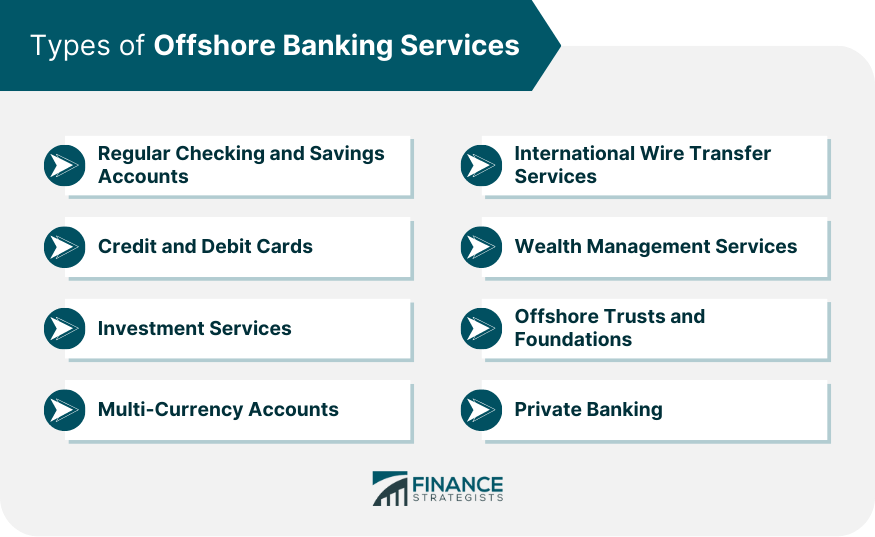How Offshore Company Formations Facilitate Wealth and Financial Structuring
Wiki Article
Debunking Offshore Company Formations: Just How They Operate and What to Expect
Offshore firm formations can appear facility and enigmatic. Offshore Company Formations. These entities, typically developed for tax advantages and personal privacy, run under one-of-a-kind lawful frameworks. Business owners may discover themselves steering via a maze of guidelines and conformity requirements. Comprehending the ins and outs is important for success. What are the actual advantages? What are the prospective risks? A closer exam exposes the subtleties that can influence decision-making significantlyRecognizing Offshore Firms: Types and meanings
Offshore companies are entities established in a jurisdiction beyond a person's or organization's key country of house, commonly for purposes connected to tax optimization, property defense, or governing advantages. These business can take various types, including restricted liability business (LLCs), global service firms (IBCs), and offshore depends on. Each type offers specific functions and interest different needs.Limited responsibility firms give owners with security from individual liability, while worldwide service firms are prominent for their versatility and marginal coverage demands. Offshore trusts, on the various other hand, are made use of mainly for estate preparation and property security.
The selection of territory substantially influences the firm's operations, as some locations offer extra positive lawful structures and privacy protections. Offshore Company Formations. Comprehending the distinctions between these kinds is crucial for people and companies thinking about offshore frameworks, as each choice lugs various effects for administration and conformity
The Benefits of Developing an Offshore Company
Establishing an offshore company can supply countless advantages, specifically for those seeking to enhance their monetary techniques and secure their possessions. One significant benefit is tax obligation optimization; several jurisdictions provide favorable tax obligation rates or exceptions, allowing businesses to retain more earnings. Additionally, overseas companies can offer a layer of privacy, protecting the identities of owners and shareholders from public scrutiny.Another benefit is asset protection. By putting properties in an offshore entity, people can safeguard their riches from potential legal insurance claims or political instability in their home countries. This structure additionally facilitates global service operations, allowing much easier accessibility to worldwide markets and varied customers.
Additionally, the facility of an offshore company can enhance reputation and reputation, interesting clients that value global service methods. On the whole, these benefits make overseas company formations an appealing choice for people and organizations aiming for economic development and safety.
Trick Considerations Prior To Creating an Offshore Entity
Prior to creating an overseas entity, a number of crucial factors must be assessed. Lawful compliance needs, tax ramifications and benefits, along with jurisdiction option, play a significant role in the decision-making procedure. Understanding these considerations can aid organizations and individuals browse the intricacies of offshore firm formations effectively.
Lawful Conformity Needs
When thinking about the formation of an offshore entity, comprehending lawful compliance demands is necessary to guarantee adherence to both global and neighborhood laws. Possible company owners need to familiarize themselves with laws governing business enrollment, reporting obligations, and functional standards in the selected jurisdiction. This consists of verifying the legal requirements for supervisors and investors, as well as making sure conformity with anti-money laundering (AML) and know-your-customer (KYC) policies. Furthermore, companies should stay familiar with any type of licensing needs details to their market. Involving regional lawful and economists can provide useful understandings, ensuring that all essential paperwork is prepared and sent appropriately. Eventually, extensive understanding of lawful conformity assists reduce threats and cultivates a sustainable overseas procedure.Tax Ramifications and Advantages
Many company owner consider the tax obligation ramifications and benefits of developing an overseas entity as a crucial element in their decision-making procedure. Offshore business can provide substantial tax advantages, such as minimized company tax prices, exemption from specific neighborhood tax obligations, and the capability to defer taxes on international income. These benefits can cause improved earnings and capital, making overseas frameworks appealing for international service operations. Furthermore, the possibility for tax treaties may even more decrease tax obligations. Nonetheless, it is very important for business proprietors to recognize the intricacies entailed, including compliance with both regional and global tax obligation laws. Engaging with tax specialists is a good idea to navigate these complexities effectively and assure optimal tax planning techniques.Jurisdiction Selection Factors
What aspects should one think about when selecting a territory for overseas business formation? Key considerations include tax obligation efficiency, regulatory environment, and political security. Jurisdictions with favorable tax obligation programs can substantially affect profitability. The regulatory landscape needs to use versatility and simplicity of conformity, enabling efficient business procedures. Political security is crucial, as it assures the safety and security of possessions and connection of procedures. Additionally, the track record of the jurisdiction can impact client trust fund and business partnerships. Accessibility to banking solutions and the accessibility of expert support services are additionally crucial. Recognizing regional regulations regarding possession, personal privacy, and coverage requirements is crucial to identify that the overseas entity aligns with the organization proprietor's goals and lawful responsibilities. Possession The Process of Setting Up an Offshore Firm Establishing an offshore business includes a series of calculated steps that call for mindful planning and compliance with worldwide policies. Initially, a specific have to select a suitable territory that aligns with their business objectives and provides favorable tax obligation benefits. Adhering to jurisdiction option, the next action is to choose an one-of-a-kind company name and prepare the essential documents, including write-ups of unification and investor contracts.As soon as the documentation is ready, it has to be sent to the pertinent authorities together with the needed costs. After authorization, the business will obtain a certification of consolidation, officially establishing its legal existence. The specific have to then open a corporate checking account to assist in financial purchases.
Maintaining an overseas company involves sticking to continuous compliance demands, such as yearly coverage and tax obligations, which vary by territory. Consequently, comprehending each step is essential for a successful overseas firm formation.
Governing and legal Structure for Offshore Companies
While developing an offshore business can supply substantial benefits, it is necessary to maneuver through the intricate legal and regulative structure that controls such entities. Each jurisdiction has its very own set of regulations that determine every little thing from company formation to taxation and conformity requirements. These laws are made to stop prohibited tasks, such as cash laundering and tax obligation evasion, and usually require extensive documents and openness.Crucial element of this structure include the need of selecting local supervisors, maintaining a registered office, and adhering to annual reporting obligations. Furthermore, many jurisdictions enforce particular licensing demands for certain organization activities. Understanding these lawful terms is critical for making sure conformity and mitigating risks connected with penalties or lawful conflicts. Engaging with legal experts that specialize in overseas business can aid in maneuvering through this intricate landscape, inevitably helping with a successful and certified offshore organization procedure.
Typical Misunderstandings About Offshore Companies
Several people hold false impressions about offshore firms, frequently equating them with tax obligation evasion and prohibited activities. It is webpage important to acknowledge that these entities can run legitimately within a structure developed for legit service methods. Making clear the legal status of overseas firms can assist eliminate these myths and advertise an extra accurate understanding of their objective.Tax Obligation Evasion Myths
Regardless of the expanding popularity of overseas companies, misunderstandings concerning their use for tax obligation evasion continue. Several individuals wrongly believe that establishing an offshore entity is solely a way to stay clear of taxes. Overseas firms are frequently utilized for genuine objectives, such as property security, international service growth, and financial investment diversity. The assumption that all offshore tasks correspond to immoral tax evasion ignores the intricacies of worldwide tax obligation policies and conformity needs. Additionally, the huge bulk of offshore territories have actually executed steps to battle tax obligation evasion, advertising openness and details exchange. This mischaracterization can discourage reputable organizations and capitalists from exploring the possible benefits of overseas firm formations while perpetuating a negative stigma surrounding these entities.Lawful Status Clarified
The legal condition of offshore business is usually misinterpreted, bring about a selection of misunderstandings. Many think these entities operate in a lawful grey location, assuming they are underhanded or inherently illegal. In truth, offshore companies are legitimate companies formed under the regulations of certain territories, developed for different reasons, including asset security and market growth. An additional common misunderstanding is that offshore business escape tax obligations completely; however, they go through the laws and tax obligation responsibilities of their home countries. Additionally, some people think that overseas business can be easily made use of for money laundering or prohibited activities. While misuse can occur, the majority of jurisdictions impose stringent conformity and transparency legislations to reduce such threats, making sure that overseas business run within legal structures.
Handling and Running Your Offshore Business Efficiently
Effectively handling and running an offshore company calls for a critical strategy that stabilizes conformity with regional laws and the search of company objectives. Effective overseas administration involves comprehending the jurisdiction's tax obligation laws, reporting needs, and operational regulations. Utilizing regional specialists, such as accountants and lawful experts, can provide very useful understandings into going across these intricacies.Additionally, establishing clear communication channels and operational procedures is vital for keeping efficiency. Making use of modern technology for task administration and partnership can improve efficiency, while normal efficiency examines warranty alignment with strategic goals.
Preserving durable economic documents is vital, as transparency fosters count on with stakeholders and complies with international criteria. Lastly, being versatile to changes in legislation or market problems enables offshore firms to pivot successfully, guaranteeing long-term sustainability and growth. By adhering to these principles, entrepreneur can maximize the benefits of their overseas endeavors while mitigating dangers.
Often Asked Questions
Just how much Does It Expense to Preserve an Offshore Firm Yearly?
The cost to keep an offshore business each year varies considerably, normally varying from $1,000 to $5,000, depending upon territory, services required, and compliance commitments. It is important to consider additional fees for specific demands.Can I Open a Savings Account for My Offshore Firm From Another Location?
Opening up a savings account for an offshore firm from another location is typically possible. Nonetheless, needs might differ by territory, commonly demanding documents and confirmation processes, which can complicate the remote application experience for people.Exist Specific Nations Known for Easier Offshore Firm Formations?
Certain countries, such as Belize, Seychelles, and the British Virgin Islands, are renowned for their favorable guidelines and structured processes relating to overseas company developments, attracting business owners looking for effectiveness and confidentiality in organization operations.
What Types of Services Are Best Matched for Offshore Firms?
Certain services, such as working as a consultant, ecommerce, and financial investment firms, usually profit from overseas firms because of tax obligation advantages, privacy, and regulative versatility - Offshore Company Formations. These entities commonly grow in territories that promote favorable business look at these guys settingsHow Can I Make Sure Compliance With Regional Legislations When Operating Offshore?
To guarantee conformity with regional regulations when operating offshore, it is necessary to involve legal specialists, perform detailed research study on jurisdiction regulations, and preserve clear financial documents, consequently reducing threats connected with non-compliance.
Report this wiki page